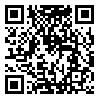Volume 3, Issue 2 (11-2019)
J Social Behav Communit Health 2019, 3(2): 378-384 |
Back to browse issues page
Download citation:
BibTeX | RIS | EndNote | Medlars | ProCite | Reference Manager | RefWorks
Send citation to:



BibTeX | RIS | EndNote | Medlars | ProCite | Reference Manager | RefWorks
Send citation to:
Aramideh Z, Sahbaeiroy F. Sustained Remission from Drug Addiction among the Attendees of the Meetings of Anonymous Addicts and Rehabilitation Centers
in Mashhad, Iran, During 2017. J Social Behav Communit Health 2019; 3 (2) :378-384
URL: http://sbrh.ssu.ac.ir/article-1-103-en.html
URL: http://sbrh.ssu.ac.ir/article-1-103-en.html
1- Department of Nursing, Tehran Medical Sciences Branch, Islamic Azad University, Tehran, Iran
2- Department of Nursing, Tehran Medical Sciences Branch, Islamic Azad University, Tehran, Iran ,fsabaei@sbmu.ac.ir
2- Department of Nursing, Tehran Medical Sciences Branch, Islamic Azad University, Tehran, Iran ,
Abstract: (2659 Views)
Background: Addiction is one of the most complex diseases of the century that for it's treatment various methods have been proposed. In this regard, one of the non-pharmacological methods with a profound effect on drug withdrawal involves the participation of addicted individuals in a 12-step anonymous addiction recovery program. The purpose of this study was to compare the sustained remission from drug addiction among individuals taking part in an anonymous recovery program and those attending a rehabilitation center for drug withdrawal.
Methods: This descriptive study was conducted on 300 participants (150 individuals of the anonymous recovery program and 150 patients of the rehabilitation center) in Mashhad, Iran, using a random sampling technique. Data collection tool was a researcher-made questionnaire consisting of two parts, namely demographic information and information related to sustained remission from drug addiction in the attendees of the two groups.
Results: The obtained results indicated that there was a significant difference between the two groups in term of withdrawal from drug abuse (χ2 = 0.08; P < 0.001). Addiction resumption occurred in 40.7, 48.4, and 10.9% of cases in the first, second, and third months, respectively. Regarding addiction relapses, 42% and 70% of patients in the rehabilitation and anonymous groups failed to accomplish the recovery, respectively. Regarding sustained remission from drug addiction among the investigated subjects, 40% of the cases in the anonymous addict group and 51.6% of individuals in the rehabilitation canter could persistently withdraw from drug abuse for more than 6 and 3 months, respectively. Accordingly, there was a significant difference between the two groups in terms of sustained remission from drug addiction (χ2 = 0.08; P < 0.001).
Conclusion: On the basis of the obtained results, it can be concluded that attendance to anonymous addict meetings can be a useful strategy to continue the addiction withdrawal after the detoxification period.
Methods: This descriptive study was conducted on 300 participants (150 individuals of the anonymous recovery program and 150 patients of the rehabilitation center) in Mashhad, Iran, using a random sampling technique. Data collection tool was a researcher-made questionnaire consisting of two parts, namely demographic information and information related to sustained remission from drug addiction in the attendees of the two groups.
Results: The obtained results indicated that there was a significant difference between the two groups in term of withdrawal from drug abuse (χ2 = 0.08; P < 0.001). Addiction resumption occurred in 40.7, 48.4, and 10.9% of cases in the first, second, and third months, respectively. Regarding addiction relapses, 42% and 70% of patients in the rehabilitation and anonymous groups failed to accomplish the recovery, respectively. Regarding sustained remission from drug addiction among the investigated subjects, 40% of the cases in the anonymous addict group and 51.6% of individuals in the rehabilitation canter could persistently withdraw from drug abuse for more than 6 and 3 months, respectively. Accordingly, there was a significant difference between the two groups in terms of sustained remission from drug addiction (χ2 = 0.08; P < 0.001).
Conclusion: On the basis of the obtained results, it can be concluded that attendance to anonymous addict meetings can be a useful strategy to continue the addiction withdrawal after the detoxification period.
Keywords: Continued Withdrawal, Drug Addiction, Meetings of Anonymous Addicts, Addiction Dropout Camps
Type of Study: Original Article |
Subject:
Psychology
Received: 2018/10/28 | Accepted: 2019/07/29 | Published: 2019/11/28
Received: 2018/10/28 | Accepted: 2019/07/29 | Published: 2019/11/28
Send email to the article author
| Rights and permissions | |
 |
This work is licensed under a Creative Commons Attribution-NonCommercial 4.0 International License. |








